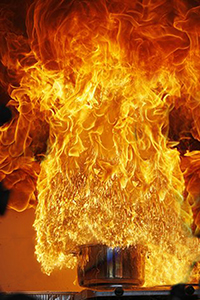Fire safety in your home - cooking safety

Each year, more accidental fires in the home are caused by cooking than anything else. Many people are spending more time at home due to the current pandemic and are cooking much more. As well as this, a lot of parents have the added distractions of home-schooling.
Distraction whilst cooking is a main cause of fire call outs right across the country.
Cooking-related fires tend to result in the most non-fatal casualties and the second most fatalities, so the importance of promoting cooking fire safety messages cannot be overestimated.
Advice on Safe Use
Chip pans are safe as long as you follow some simple guidelines.
Before putting food in the pan dry the food and test the temperature of the oil by putting in a small piece of bread. If the bread crisps quickly the oil is ready.
Never fill a pan more than one-third full of fat or oil.
Never leave the pan unattended when the heat is switched on.
Never put the food in the pan if the oil begins to give off smoke.
Turn off the heat and leave the oil to cool, otherwise it could catch fire.
If your pan DOES catch fire
Turn off the heat if it is safe to do so. GET OUT, STAY OUT AND CALL US OUT
Whatever you do, don't throw water over the fire and don't move the pan, the effects can be devastating.
If you are in any doubt about whether to try to put out a chip pan fire yourself then don't.
Leave the room, close the door and call the fire and rescue service.
The best way to avoid chip pan fires is not to have a chip pan! Think about buying a deep fat fryer with a thermostatic control or try Oven Chips.
Cumbria Fire and Rescue Service's top tips for staying safe in the kitchen are:
- Don't leave cooking unattended.
- If a pan catches fire, don't take any risks - Get out, stay out and call 999.
- Keep tea towels and cloths away from the cooker and hob.
- Take care if you're wearing loose clothing - this can easily catch fire.
- Avoid leaving children in the kitchen alone when cooking.
- Keep matches and saucepan handles out of children's reach to keep them safe.
- Take care with electrics - keep leads and appliances away from water and place grills and toasters away from curtains and kitchen rolls.
- Keep your equipment clean and in good working order. A build-up of fat and grease can ignite a fire.
- Don't cook after drinking alcohol.
- Hot oil can catch fire easily - be careful that it doesn't overheat.
- Never throw water on a chip pan fire.
- In the event of a fire, have an escape plan in place.
- Don't take risks by tackling a fire. Get out, stay out and call 999.
- Make sure you have at least one smoke alarm on every level of your home and test them regularly.
The Islamic holy month of Ramadan has just begun. It is a time when Muslims across the world look to take part in this important, annual religious event which sees many within our communities fasting between sunrise and sunset. This year's fast takes place at a time of year when the daylight hours are still getting longer.
Cooking fires are the biggest cause of accidental house fires in Cumbria. Dinner time in many family households can be a chaotic time, with lots of activity around the home but for those observing Ramadan, cooking at unusual times, especially when combined with fatigue can be extra challenging.
Craig Drinkald, Area Manager - Head of Community Safety said: "We would like to wish all members of the Muslim community well during this very important time but also want to take the opportunity to stress the need to remain vigilant to fire risks in the home during this time too, particularly when it comes to cooking in loose clothing.
In previous years, there have been several loose clothing fires within the community resulting in some serious burns injuries. Whilst many of these incidents were as a result of standing too close to heaters it does highlight the issue around wearing loose fitting clothing near heat sources, which in a kitchen could easily occur whilst cooking over gas hobs.
We want to ensure that people stay safe from fire and take into consideration the safety and wellbeing of both themselves and other members of their family."
A few fire safety essentials to keep in mind are:
- Smoke alarms. Do you have one? Is it working? Do you know what to do if it goes off? Having a working smoke alarm is a great start to being fire safety conscious in the home but its vital everyone knows what to do if it goes off too. Plan your escape route and share it, so that in the event the worst happens everyone knows what to do
- Loose clothing - keep it tied back. Clothing ignites easier than you may realise, so ensure scarves or long sleeves are a safe distance away from the hob. You should also ensure tea towels, cloths or electrical leads are a safe distance away from hobs too
- Cooking with oil - When cooking with hot oil be vigilant. If the oil starts to smoke, do not add food. Turn the burner off and allow it to cool
- Oversized pots - they can be handy when cooking for large groups of people, but using several oversized pots on a gas cooker can cause a build-up of carbon monoxide, which can be deadly
Remember if a fire does start, do not tackle it yourself, get out and get the fire service out!
You can get further fire safety information by completing the Safe and Well questionnaire, contacting 0800 358 4777 or emailing hart@cumbria.gov.uk